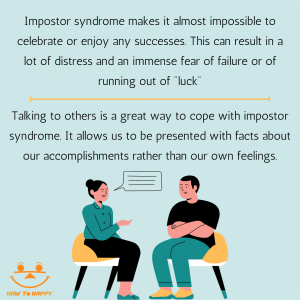
Impostor syndrome can be very difficult to live with. It prevents us from experiencing joy after any sort of accomplishment and makes us believe that we’re frauds or simply lucky. This makes it almost impossible for us to recognize our skills and abilities.
We’ve all felt like luck played a role in some of our successes, however, we shouldn’t constantly believe this and let it result in us feeling incompetent. If your impostor syndrome is holding you back, here are four tips that will prevent it from taking over your life.
Separate Facts from Beliefs
The first thing we need to recognize is that our impostor syndrome is not based on facts. It’s simply our own thoughts and feelings of inadequacy. Constantly remembering this is key. It can be difficult to remind ourselves all the time, especially at first, so talking to someone about it is a great option.
Comparing ourselves to others or constantly being brought down by someone can worsen our impostor syndrome or even be the root of it. Talking to someone trustworthy who can help remind you that your beliefs aren’t facts will be extremely helpful. If you don’t have anyone in your life that you can go to, consider a therapist. Or even group therapy which can be more affordable. The goal isn’t to seek validation, but rather to have a voice of reason. Being stuck in your head all the time and having your thoughts distort your reality will only worsen your impostor syndrome.
Prove Your Impostor Syndrome Wrong
The best way to overcome impostor syndrome is to prove to yourself that those negative beliefs are nowhere near true. A great way to do that is to try new things. Think about it, no matter what you accomplish, you still believe that it’s all due to luck. So what about doing something you’ve never tried before?
Whether it’s pottery, baking, swimming, or even photography, do something you’ve never tried or at least never committed to. By doing something you’re unsure of ability-wise, you can start to recognize what skills you have, and equally as important, what skills you don’t have. This will all put into perspective that you aren’t “lucky.” You’re simply good at some things and not so great at others. This will allow you to give yourself more credit for your accomplishments. You’re not lucky or a fraud for being good at what you’re good at. If it were simply luck, then you would be great at everything.
Celebrate Every Little Success
A great way to beat impostor syndrome is to celebrate all of our successes despite our feelings of incompetence. The goal is to reframe our thoughts by giving ourselves credit for everything we achieve.
Passing a test may seem like a minor achievement and we might even think “oh, it was multiple choice and I got lucky”, but that should also be celebrated. Everything we put any sort of effort into that ends up with success, no matter how minor, should be celebrated. It doesn’t have to be a major celebration. You could allow yourself more time to do something you enjoy like watching your favorite show, for example. Or even going out to eat your favorite meal. Whatever it is, reward yourself whenever your impostor syndrome starts to get the best of you after an achievement.
Find Out Who Else has Impostor Syndrome
We spend so much time comparing ourselves to successful people who probably also suffer from impostor syndrome. Finding out who shares that experience with you can be extremely helpful. Especially if it’s someone who is without a doubt extremely intelligent, successful, etc.
Think of someone successful you know who looks confident and ask them if they feel like they made it due to their skills. More often than not, you’ll find that the answer is “no.” Impostor syndrome is much more common than we think. Knowing that someone who deserves credit for their accomplishments also suffers from it can help you start to view yourself differently.
Stay Aware of Your Impostor Syndrome
To beat your impostor syndrome, you need to constantly remind yourself that you aren’t the problem. Your impostor syndrome is just getting the best of you. If you stay aware of that, it will be easier to beat those irrational thoughts and feelings. It takes time, but you’ll get there.
Exercise:
1- Who’s someone you can talk to? Share how your impostor syndrome is impacting you.
2- What’s something you’ve never done before? Try a few new things.
3- Celebrate all your successes. What was a recent one? Reward yourself for it.
4- Find out who else has impostor syndrome. Ask someone successful if they struggle with it & if they have any tips.

